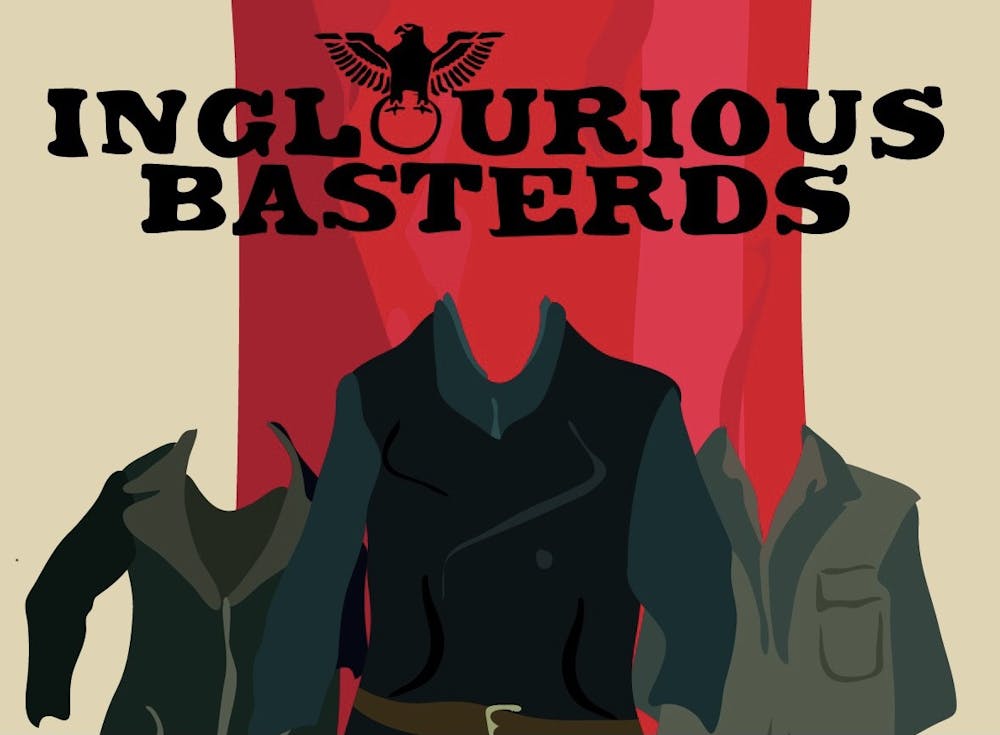Quentin Tarantino's films, from Pulp Fiction to Kill Bill to Django Unchained, exemplify quintessential revenge fantasies. His protagonists are unyielding in their quests to seek violent vengeance upon those who have wronged them. His 2009 film Inglourious Basterds is no exception, blending "fantasy and fact" and following several intertwining storylines to rewrite history—in this case, by following two plots to destroy the Third Reich in 1944.
The film begins with the Basterds, a unit of Jewish–American soldiers who hunt down and frighten Nazis by interrogating them and carving swastikas in their foreheads. Controversially, the Basterds also kill and scalp Nazis who don't comply. The audience is also introduced to Shosanna Dreyfus, a young woman who owns a cinema in Paris and is the sole survivor from her Jewish family. Both the Basterds and Dreyfus conspire to kill a group of important Nazi figures, including Adolf Hitler, at a movie premiere. Though their plans are separate, they both succeed: the theater goes up in flames, and the Basterds go on a shooting spree.
Inglourious Basterds sparked controversy among Jewish and non–Jewish audiences alike. On one hand, Jewish actor Eli Roth and producer Lawrence Bender found it grotesquely satisfying to act out the Nazi–murdering fantasy. However, in an interview with the Jewish Telegraphic Agency, writer Daniel Mendelsohn argued that it is problematic for Jews to fight back against Nazis or neo–Nazis by using their violent tactics.
The film's integrity was also questioned due to its manipulation of history. What’s the point of depicting Hitler’s death at the hands of Jews if it never happened? In reimagining history, do we erase the significance of the events that truly took place?
A common phrase I always hear in Holocaust discussion is “never again.” However, we are currently seeing history repeat itself, with neo–Nazis unifying and gaining power under the Trump administration. As antisemitism continues to rise globally, Jews are placed in a painfully familiar situation. I’ve learned about the Holocaust throughout my entire life. I've read books, watched films, visited multiple concentration camps in Europe, and heard the stories of survivors like my great–grandparents. The most terrifying feeling in the world is seeing the horrors of history come back to life, slowly but strongly.
Violence aside, the central message of Inglourious Basterds is one that should motivate all of us, Jewish or not, to prevent hate from taking over. As Dreyfus hijacks the movie premier and her face fills our screen, surrounded by flames, she exclaims, “This is the face of Jewish vengeance!”
Whether you find the killing of German Nazis by Jewish soldiers empowering or silly, I urge you to shift your focus from past to present. Despite the criticism Tarantino's films face for rewriting history, it’s valid to reimagine the past, because of the fact that history repeats itself. By reimagining the past, we can realize potential outcomes and learn from historical mistakes. In the context of the world right now, Inglourious Basterds serves as an emblem of Jewish justice and a reminder of our resilience.
Nazism did not fall with the Third Reich, nor did it die with Hitler. Antisemitism existed long before and continues to exist long after the Holocaust. Recently, the rioters who broke into the Capitol on January 6th proudly showed off Nazi and antisemitic imagery. One rioter wore a shirt that read “Camp Auschwitz" and another wore one that said “6MWE,” which stands for “6 million wasn’t enough.”
Justice and vengeance are not one and the same, but Inglourious Basterds demonstrates how they can intersect. “Jewish vengeance” doesn’t mean we’re to go around marking Nazis with swastikas or scalping them. The ultimate Jewish triumph is being able to live freely, to reclaim exactly what Hitler tried to eliminate. Defying him by passing down our traditions, learning about our past, and thriving in the world is both our vengeance and our justice. Inglourious Basterds uses the past as a vessel to illustrate this concept—a message we can and must use to dictate our present and our future.

